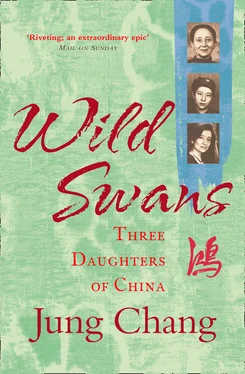On the eve of Chinese New Year 1947 he returned to his family home in Yixian to spend the festival period with his brother and his elderly father. As if he felt that this was to be their last meeting, he stayed on. He fell gravely ill, and died in the summer. He had told my grandmother that the only regret he would have in dying was not being able to fulfil his filial duty and hold a grand funeral for his father.
But he did not die without fulfilling his obligation to my grandmother and her family. Even though he refused to take Yu-lin into intelligence work, he acquired an identity card for him which said he was a Kuomintang intelligence official. Yu-lin never did any work for the intelligence system, but his membership guaranteed him against being conscripted, and he was able to stay and help Dr Xia in the medicine shop.
One of the teachers at my mother’s school was a young man named Kang, who taught Chinese literature. He was very bright and knowledgeable, and my mother respected him tremendously. He told her and some other girls that he had been involved in anti-Kuomintang activities in the city of Kunming in southwest China, and that his girlfriend had been killed by a hand grenade during a demonstration. His lectures were clearly pro-Communist, and made a strong impression on my mother.
One morning in early 1947 my mother was stopped at the school gate by the old porter. He handed her a note and told her that Kang had gone. What my mother did not know was that Kang had been tipped off, as some of the Kuomintang intelligence agents were secretly working for the Communists. At the time my mother did not know much about the Communists, or that Kang was one of them. All she knew was that the teacher she most admired had had to flee because he was about to be arrested.
The note was from Kang, and consisted of only one word: ‘Silence’. My mother saw two possible meanings in this word. It could refer to a line from a poem Kang had written in memory of his girlfriend, ‘Silence—in which our strength is gathering’, in which case it might be an appeal not to lose heart. But the note could also be a warning against doing something impetuous. My mother had by then established quite a reputation for fearlessness, and she commanded support among the students. The next thing she knew a new headmistress arrived. She was a delegate to the National Congress of the Kuomintang, reputedly with ties to the secret services. She brought with her a number of intelligence men, including one called Yao-han, who became the political supervisor, with the special task of keeping a watch on the students.
The academic supervisor was the district party secretary of the Kuomintang.
My mother’s closest friend at this time was a distant male cousin called Hu. His father owned a chain of department stores in Jinzhou, Mukden, and Harbin, and had a wife and two concubines. His wife had produced a son, Cousin Hu, while the concubines had not. Cousin Hu’s mother therefore became the object of intense jealousy on their part. One night when her husband was out of the house the concubines drugged her food and that of a young male servant, then put them into the same bed. When Mr Hu came back and found his wife, apparently blind drunk, in bed with the servant, he went berserk; he locked his wife up in a tiny room in a remote corner of the house, and forbade his son to see her again. He had a sneaking suspicion that the whole thing might have been a plot by his concubines, so he did not disown his wife and throw her out, which would have been the ultimate disgrace (to himself as well as to her). He was worried that the concubines might harm his son, so he sent him away to boarding school in Jinzhou, which is how my mother met him, when she was seven and he was twelve. His mother soon went mad in her solitary confinement.
Cousin Hu grew up to be a sensitive boy who kept to himself. He never got over what had happened, and occasionally talked to my mother about it. The story made my mother reflect on the blighted lives of women in her own family and on the numerous tragedies that had happened to so many other mothers, daughters, wives, and concubines. The powerlessness of women, the barbarity of the age-old customs, cloaked in ‘tradition’ and even ‘morality’, enraged her. Although there had been changes, they were buried by the still overwhelming prejudice. My mother was impatient for something more radical.
In her school she learned that one political force had openly promised change—the Communists. The information came from a close friend of hers, an eighteen-year-old girl called Shu who had broken with her family and was staying in the school because her father had tried to force her into an arranged marriage with a boy of twelve. One day Shu bade farewell to my mother: she and the man she was secretly in love with were running away to join the Communists. ‘They are our hope,’ were her parting words.
It was about this time that my mother became very close to Cousin Hu, who had realized that he was in love with her when he found that he was very jealous of young Mr Liu, whom he regarded as a dandy. He was delighted when she broke up with Liu, and came to see my mother almost every day.
One evening in March 1947 they went to the cinema together. There were two kinds of tickets: one for a seat; the other, which was much cheaper, for standing only. Cousin Hu bought my mother a seat, but a standing ticket for himself, saying he did not have enough money on him. My mother thought this was a bit odd, and so she stole a glance in his direction every now and then. Halfway through the film she saw a smartly dressed young woman approach him, slide by him slowly, and then, for a split second, their hands touched. She got up at once and insisted on leaving. When they got outside she demanded an explanation. At first Cousin Hu tried to deny that anything had happened; when my mother made it clear she was not going to swallow this, he said he would explain later. There were things my mother could not understand, he said, because she was too young. When they reached her house, she refused to let him in. Over the next few days he called repeatedly, but my mother would not see him.
After a while, she was ready for an apology and a reconciliation, and would keep looking out towards the gate to see if he was there. One evening, when it was snowing hard, she saw him coming into the courtyard accompanied by another man. He did not make for her part of the house, but went straight to where the Xias’ tenant, a man called Yu-wu, was living. After a short time Hu reemerged and walked briskly over to her room. With an urgent edge to his voice, he told her he had to leave Jinzhou immediately, as the police were after him. When she asked him why, all he said was, ‘I am a Communist’, and disappeared into the snowy night.
It dawned on my mother that the incident in the cinema must have been a clandestine mission of Cousin Hu’s. She was heartbroken, as there was now no time to make up with him. She realized that their tenant, Yu-wu, must also be an underground Communist. The reason Cousin Hu had been brought to Yu-wu’s quarters was to hide there. Cousin Hu and Yu-wu had not known each other’s identity until this evening. Both of them realized it was out of the question for Cousin Hu to stay there, as his relationship with my mother was too well known, and if the Kuomintang came to the house to look for him Yu-wu would be discovered as well. That same night Cousin Hu tried to make for the Communist-controlled area, which lay about twenty miles beyond the city boundaries. Some time later, as the first buds of spring were bursting out, Yu-wu received news that Hu had been captured as he left the city. His escort had been shot dead. A later report said Hu had been executed.
My mother had been turning more and more strongly against the Kuomintang for some time. The only alternative she knew was the Communists, and she had been particularly attracted by their promises to put an end to injustices against women. Up to now, at the age of fifteen, she had not felt ready to commit herself fully. The news of Cousin Hu’s death made her mind up. She decided to join the Communists.
Читать дальше












